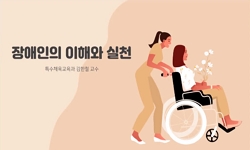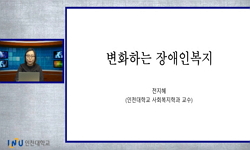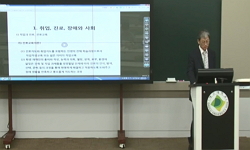In Korea Section 7 of the Minimum Wage Act allows exemptions from the minimum wage in the case of employee whose productivity is seriously impaired by mental or physical disabilities. Any employer otherwise required to pay the minimum wage can obtain ...
http://chineseinput.net/에서 pinyin(병음)방식으로 중국어를 변환할 수 있습니다.
변환된 중국어를 복사하여 사용하시면 됩니다.
- 中文 을 입력하시려면 zhongwen을 입력하시고 space를누르시면됩니다.
- 北京 을 입력하시려면 beijing을 입력하시고 space를 누르시면 됩니다.

장애인 직업재활시설과 근로장애인에 대한 최저임금 배제 — 한국, 독일, 미국의 법제 비교를 중심으로 — = Sheltered Workshops and Minimum Wage Exemptions for Persons with Disabilities
한글로보기부가정보
다국어 초록 (Multilingual Abstract)
The most person to whom the exemptions apply are people with disabilities in sheltered workshops. Sheltered workshops were conceived as facilities where employment opportunities were set aside for employees with disabilities, usually at a low wage, and were sheltered from competition by individuals without disabilities. They also provided an opportunity for people with significant disabilities to pursue a life that included work, socializing, and a sense of belonging. Sheltered workshops were seen as progressive, and a means of employing those who could not compete for jobs in the community.
Exempting disabled employees from the minimum wage, however, would be likely to increase discrimination against disabled people by giving a signal to employers that disabled employees can be treated less favorably. In this regard Korean disability rights organizations have opposed minimum wage exemptions for the person with disabilities on the grounds of discrimination based on disabilities.
But Korea is not the only country involved in policy issues regarding the employment of people with disabilities in sheltered workshops and minimum wage exemptions.
Similarly, many countries have made use of sheltered workshops for employment of the disabled. The debate over sheltered workshops and the minimum wage exemptions is part of a larger issue of the employment needs of people with significant disabilities in most countries.
This study provides an overview of the policy measures to encourage the employment with disabilities particularly in sheltered workshop and minimum wage exemptions in Korea.
It will trace the history of the use of sheltered workshops and disability law policy in Germany and the United States. Next, it will examine existing laws and policies on the employment of disabled persons in sheltered workshops in these countries.
The arguments for and against the use of sheltered workshops and minimum wage exemptions will also be considered in this article.
Finally, it will be argued that Korean policymakers should find alternative minimum wage exemptions for the disabled, possibly through the use of sub-minimum wage or the difference pay between sub-minimum wage and average wage by the state. Especially disabled employees with very low levels of productivity should helped through supported employment programmes, subsidized through the state.
In Korea Section 7 of the Minimum Wage Act allows exemptions from the minimum wage in the case of employee whose productivity is seriously impaired by mental or physical disabilities. Any employer otherwise required to pay the minimum wage can obtain authority from the Department of Employment and Labor to pay the lower wage rates permitted by law.
The most person to whom the exemptions apply are people with disabilities in sheltered workshops. Sheltered workshops were conceived as facilities where employment opportunities were set aside for employees with disabilities, usually at a low wage, and were sheltered from competition by individuals without disabilities. They also provided an opportunity for people with significant disabilities to pursue a life that included work, socializing, and a sense of belonging. Sheltered workshops were seen as progressive, and a means of employing those who could not compete for jobs in the community.
Exempting disabled employees from the minimum wage, however, would be likely to increase discrimination against disabled people by giving a signal to employers that disabled employees can be treated less favorably. In this regard Korean disability rights organizations have opposed minimum wage exemptions for the person with disabilities on the grounds of discrimination based on disabilities.
But Korea is not the only country involved in policy issues regarding the employment of people with disabilities in sheltered workshops and minimum wage exemptions.
Similarly, many countries have made use of sheltered workshops for employment of the disabled. The debate over sheltered workshops and the minimum wage exemptions is part of a larger issue of the employment needs of people with significant disabilities in most countries.
This study provides an overview of the policy measures to encourage the employment with disabilities particularly in sheltered workshop and minimum wage exemptions in Korea.
It will trace the history of the use of sheltered workshops and disability law policy in Germany and the United States. Next, it will examine existing laws and policies on the employment of disabled persons in sheltered workshops in these countries.
The arguments for and against the use of sheltered workshops and minimum wage exemptions will also be considered in this article.
Finally, it will be argued that Korean policymakers should find alternative minimum wage exemptions for the disabled, possibly through the use of sub-minimum wage or the difference pay between sub-minimum wage and average wage by the state. Especially disabled employees with very low levels of productivity should helped through supported employment programmes, subsidized through the state.
참고문헌 (Reference)
1 박숙경, "한국의 장애인 탈시설 현황과 과제" 한국지적장애교육학회 18 (18): 205-234, 2016
2 방준식, "최저임금제도의 새로운 구상과 법적 과제" 노동법이론실무학회 (22) : 1-22, 2017
3 전영환, "최저임금 적용제외 인가기준에 관한 연구" 한국장애인고용공단 고용개발원 2008
4 김용탁, "최저임금 적용제외 대상자에 대한 고용보조금 지급 방안검토" 한국장애인고용공단 고용개발원 2014
5 남용현, "직업재활시설 근로장애인의 노동시장 전이 활성화 방안" 한국장애인고용공단 고용개발원 2017
6 우주형, "중증장애인직업재활지원사업의 효율성 분석 및 발전 방안" 2016
7 나운환, "중증장애인 직업재활사업의 성과와 개선방안" 한국직업재활학회 26 (26): 77-89, 2016
8 비마이너, "장애인은 왜 최저임금 적용 대상이 안 되나? 독소조항 폐지하라"
9 박현숙, "장애인보호작업장의 문제점과 활성화 방안" 24 (24): 123-145, 2014
10 뉴시스, "장애인 최저임금 적용제외 조항 삭제하라"
1 박숙경, "한국의 장애인 탈시설 현황과 과제" 한국지적장애교육학회 18 (18): 205-234, 2016
2 방준식, "최저임금제도의 새로운 구상과 법적 과제" 노동법이론실무학회 (22) : 1-22, 2017
3 전영환, "최저임금 적용제외 인가기준에 관한 연구" 한국장애인고용공단 고용개발원 2008
4 김용탁, "최저임금 적용제외 대상자에 대한 고용보조금 지급 방안검토" 한국장애인고용공단 고용개발원 2014
5 남용현, "직업재활시설 근로장애인의 노동시장 전이 활성화 방안" 한국장애인고용공단 고용개발원 2017
6 우주형, "중증장애인직업재활지원사업의 효율성 분석 및 발전 방안" 2016
7 나운환, "중증장애인 직업재활사업의 성과와 개선방안" 한국직업재활학회 26 (26): 77-89, 2016
8 비마이너, "장애인은 왜 최저임금 적용 대상이 안 되나? 독소조항 폐지하라"
9 박현숙, "장애인보호작업장의 문제점과 활성화 방안" 24 (24): 123-145, 2014
10 뉴시스, "장애인 최저임금 적용제외 조항 삭제하라"
11 이민영, "장애인 최저임금 감액적용 제도도입시 작업능력평가 개편방향" 한국장애인고용공단 고용개발원 2015
12 이병화, "장애인 직업재활시설 유형 개편을 위한 쟁점 및 향후 정책 방향 연구" 한국장애인고용공단 고용개발원 27 (27): 133-159, 2017
13 서종녀, "시설거주 장애인의 탈시설을 위한 주거지원 정책 현황 및 발전방안" 777-792, 2014
14 강동욱, "보호작업장 내 중증장애인의 근로자성과 정책적 개선방안" 한국직업재활학회 16 (16): 105-123, 2006
15 강동욱, "보호작업시설내 중증장애인의 근로자성 여부 연구" 한국장애인고용공단 고용개발원 2005
16 황주희, "발달장애인 직업재활정책의 방향 모색: 미국의 발달장애인 지원정책의 변화를 중심으로" 한국장애인복지학회 34 (34): 65-92, 2016
17 한인상, "「최저임금법」 개정의 주요 쟁점과 과제 - 법률안의 분석을 중심으로" 노동법이론실무학회 (22) : 23-68, 2017
18 "Wirtschafts- und Sozialwissenschaftliches Institut, Ein Jahr Mindeslohn in Deutschland - Erfahrungen und Perspektiven" 2016
19 Lonitz, Manuela, "Wie sinnvoll sind Behindertenwerkstätten wirklich?"
20 Stockton, Halle, "What Happens When Sheltered Workshops Close?"
21 Zeit Online, "Werkstätten: kein Mindestlohn, keine Inklusion"
22 BIH(intetrationsämter), "Werkstatt für behinderte Menschen"
23 United States Department of Labor, "Wage and Hour Division (WHD), Subminimum Wage Employment for Workers with Disabilities"
24 United States Department of Labor, "Wage and Hour Division (WHD), Executive Order 13658, Establishing a Minimum Wage for Contractors: Annual Update"
25 Deutscher Bundestag, "Vergütung und rentenrechtliche Absicherung für Beschäftigte in Werkstätten für behinderte Menschen"
26 Sozialverband VdK Deutschland e.V., "Urteil: Kein Mindestlohn für behinderte Menschen in Behindertenwerkstatt"
27 Preedy, Melia, "Subminimum or Subpar? A Note in Favor of Repealing the Fair Labor Standards Act's Subminimum Wage Program" 37 : 1097-, 2014
28 TRIB Live, "Sheltered workshops for disabled face uncertainty from proposed Pennsylvania rules"
29 Kassel, David, "Questions surround phase-out of sheltered workshops for the developmentally disabled"
30 Decker, Curtis L., "People with Disabilities Deserve a Minimum Wage"
31 Sommerstein, David, "NPR, Advocates Fight To Keep Sheltered Workshops For Workers With Disabilities"
32 Bundesministerium für Arbeit und Soziales, "Mindestlohn"
33 Einfach teilhaben, "In einer Werkstatt für behinderte Menschen arbeiten"
34 "In Werkstätten beschäftigte behinderte Menschen erhalten keinen gesetzlichen Mindestlohn"
35 Lebenshilfe, "In Werkstätten beschäftigte behinderte Menschen erhalten keinen gesetzlichen Mindestlohn"
36 "Grundsicherung für Menschen mit einer Behinderung, Schwerbehindertenausweis"
37 Nettles, Jessica L., "From Sheltered Workshops to Integrated Employment:A Long Transition"
38 Nettles, Jessica L., "From Sheltered Workshops to Integrated Employment:A Long Transition"
39 Lewis, Anil, "Fair Wages for People with Disabilities"
40 Bendel, Alexander, "Entgelt und Entgeltordnungen in Werkstätten für Menschen mit Behinderungen"
41 Brennan-Krohn, Zoë, "Employment for People with Disabilities: A Role for Anti-Subordination" 51 : 239-, 2016
42 Collins, Benjamin, "Disailities: Frequently Asked Questions"
43 Terminiello, James, "Closing sheltered workshops is road to disaster"
44 Leighton, Taylor, "Can employers actually pay disabled Americans below the minimum wage?"
45 "Bundesarbwitsgemeinschaft Werkstätten für behinderte Menschen, Werkstatt und Geschichte"
46 Rechtslupe, "Behindertenwerkstätten – und der Mindestlohn"
47 Hoffman, Laura C, "An Employment Opportunity or a Discrimination Dilemma?: Sheltered Workshops and the Employment of the Disabled" 151-, 2013
48 NCPR, "Advocates Fight To Keep Sheltered Workshops For Workers With Disabilities"
49 한국장애인고용공단 고용개발원, "2016 장애인경제활동실태조사" 2016
50 한국장애인개발원, "2015 장애인백서"
51 "(Almost) Everything You Need to Know About Sheltered Workshops (Part 2 of 2)"
52 "(Almost) Everything You Need to Know About Sheltered Workshops (Part 1 of 2)"
동일학술지(권/호) 다른 논문
-
- 한국비교노동법학회
- 한인상
- 2017
- KCI등재
-
남녀고용평등법의 쟁점에 대한 고찰 — 차별금지와 직장 내 성희롱을 중심으로 —
- 한국비교노동법학회
- 심재진
- 2017
- KCI등재
-
정기상여금에 붙은 ‘지급일 재직 조건’의 문제점 — 대상판결: 대법원 2017. 9. 26. 선고 2017다232020 판결 —
- 한국비교노동법학회
- 권오성
- 2017
- KCI등재
-
일본의 동일노동 동일임금의 실현을 위한 비정규직법 개정 논의와 시사점
- 한국비교노동법학회
- 김진영
- 2017
- KCI등재
분석정보
인용정보 인용지수 설명보기
학술지 이력
| 연월일 | 이력구분 | 이력상세 | 등재구분 |
|---|---|---|---|
| 2026 | 평가예정 | 재인증평가 신청대상 (재인증) | |
| 2020-01-01 | 평가 | 등재학술지 유지 (재인증) |  |
| 2017-01-01 | 평가 | 등재학술지 유지 (계속평가) |  |
| 2013-01-01 | 평가 | 등재학술지 유지 (등재유지) |  |
| 2010-01-01 | 평가 | 등재학술지 선정 (등재후보2차) |  |
| 2009-01-01 | 평가 | 등재후보 1차 PASS (등재후보1차) |  |
| 2007-01-01 | 평가 | 등재후보학술지 선정 (신규평가) |  |
학술지 인용정보
| 기준연도 | WOS-KCI 통합IF(2년) | KCIF(2년) | KCIF(3년) |
|---|---|---|---|
| 2016 | 0.62 | 0.62 | 0.57 |
| KCIF(4년) | KCIF(5년) | 중심성지수(3년) | 즉시성지수 |
| 0.57 | 0.63 | 0.876 | 0.07 |





 DBpia
DBpia







